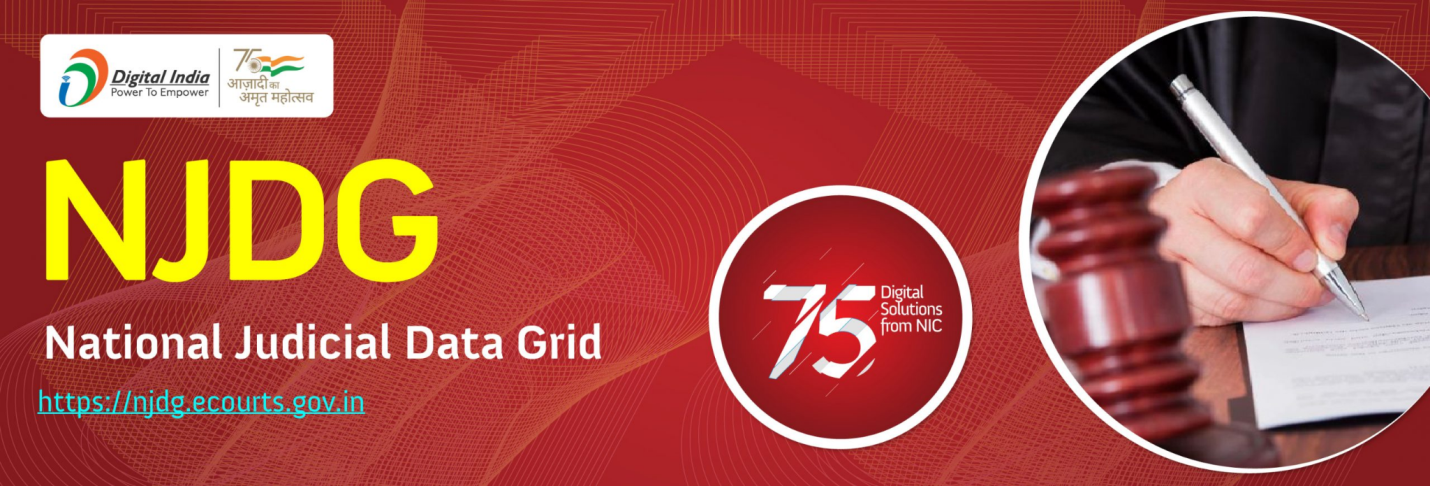Description

Copyright infringement not intended
Picture Courtesy: www.nic.in
Context: The National Judicial Data Grid (NJDG) is a comprehensive online database that aggregates orders, judgments, and case details from District and Subordinate Courts and High Courts as part of the eCourts Project. It serves as a platform for accessing judicial proceedings and decisions from computerized courts across the country. With nearly real-time updates, this platform offers a wealth of data related to legal proceedings at the district, subordinate, and high court levels.
Details
- Under the umbrella of the eCourts Project, the NJDG has emerged as a groundbreaking online platform, encompassing data on orders, judgments, and case specifics from 18,735 District and subordinate Courts and High Courts. This digital repository is updated in near real-time by linked District and Taluka courts, furnishing an intricate tapestry of judicial proceedings from across the nation.
Foundation and Collaboration
- Conceptualized in 2015, the NJDG was brought to life through the collaborative efforts of the e-Committee Supreme Court of India, the Department of Justice, and the National Informatics Centre (NIC). With High Courts and Subordinate Courts participating, it morphed into a dynamic system to monitor case pendency and disposals.
- It has emerged as not just a tool but a decision-making support system for policy adjustments to mitigate delays and reduce case backlogs. Furthermore, its efficacy extends to performance monitoring, highlighting systemic bottlenecks and allowing resource allocation optimization.
Features
- Data Diversity: The NJDG encapsulates both civil and criminal cases, supporting nuanced analyses based on case age, State, and District. Its integration with Land Records data from 26 States bolsters its relevance in tracking land dispute cases.
- Litigant Accessibility: With a user-friendly interface, NJDG grants litigants access to case status data for over 23.58 crore cases and 22.56 crore orders/judgments from computerized courts. It goes beyond mere access, providing SMS and email alerts to keep litigants informed about their case progression.
- API Integration: NJDG's Open Application Programming Interface (API) extends accessibility, allowing government entities to tap into the data using authorized credentials. The plan to broaden this access demonstrates a commitment to democratizing legal information.
- Granular Insights: A noteworthy development is the inclusion of reasons for case delay on the NJDG portal. This micro-level tracking facilitates addressing issues that contribute to pendency.

Benefits
- Monitoring Tool: NJDG effectively identifies, manages, and reduces case pendency, streamlining judicial processes.
- Policy Insights: NJDG offers timely data for policymaking, enabling informed decisions that mitigate delays in case disposal.
- Performance Enhancement: The system aids in monitoring court performance, and optimizing resource allocation for efficient operations.
- Transparency: NJDG fosters transparency by making case-related information accessible to stakeholders, promoting openness.
Impact
- Transparency and Accountability: NJDG significantly bolsters transparency and accountability by publicly displaying comprehensive case pendency and dispositions.
- Judicial Planning: It assists in judicial planning, enabling remote administration, and empowering High Court and District Judges with data-driven insights.
- Policy Support: NJDG's data aids in formulating effective policies and decisions, enhancing the overall governance of the judicial system.
Recognitions
- The NJDG's transformative impact has garnered recognition on national and international stages. The World Bank, in its Ease of Doing Business report for 2018, extolled NJDG for generating case management reports that bolster contract enforcement.
- The United Nations Development Programme (UNDP) hailed NJDG as a best practice, particularly in ensuring access to justice for marginalized populations.
Challenges
- Data Quality: Upholding data accuracy and consistency necessitates continuous attention and validation.
- Interoperability: Ensuring seamless data exchange across disparate court systems is a complex task.
- Stakeholder Capacity: Enhancing awareness and skills among judges, lawyers, and litigants is crucial to optimize NJDG's potential.
- Data Security: Protecting stored data from unauthorized access or misuse demands robust security measures.
Way Forward
- Data Guidelines: Establishing standardized procedures for data entry, validation, and updates.
- Quality Control: Developing mechanisms for data audit and quality assessment.
- Technological Leap: Exploring cloud computing and blockchain for a unified court platform.
- Capacity Building: Educating stakeholders to maximize NJDG's utility.
- Security Measures: Implementing encryption and access controls to safeguard data.
.jpg)
Conclusion
- The NJDG is a trailblazing innovation that has catalyzed transparency, accessibility, and accountability within India's judicial system. Through continuous enhancement and adaptation, the NJDG has the potential to transcend borders and serve as a global benchmark in promoting efficiency, equity, and excellence in judiciaries around the world.
Must Read Articles:
E-COURTS: https://www.iasgyan.in/daily-current-affairs/e-courts#:~:text=It%20is%20a%20Centrally%20Sponsored,complexes%2C%20and%20digital%20computer%20rooms.
PENDENCY OF COURT CASES IN INDIA: https://www.iasgyan.in/ias-gazette-magazine/pendency-of-court-cases-in-india
CASE PENDENCY IN LOWER COURTS: https://www.iasgyan.in/daily-current-affairs/case-pendency-in-lower-courts
|
PRACTICE QUESTION
Q. How does the National Judicial Data Grid play a crucial role in ensuring timely justice and reducing case backlog in India? What impact has it demonstrated in addressing case pendency, and what challenges does it encounter in its implementation? What strategies are being considered to amplify its impact and overcome these challenges moving forward?
|
https://pib.gov.in/PressReleasePage.aspx?PRID=1951373















